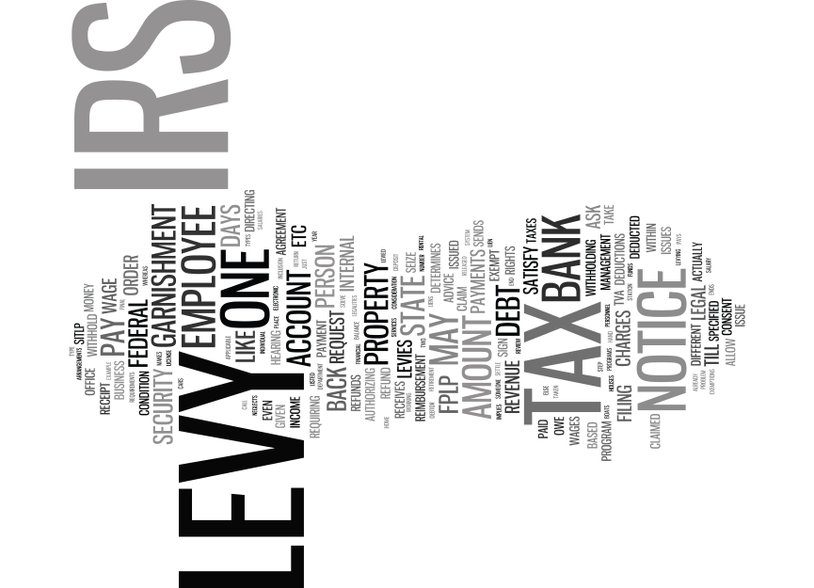The IRS has a legal right to seize a taxpayer’s property for overdue tax debt. IRS property levies are one of the most severe tax collection processes imposed by the IRS for unpaid taxes. If you have a tax balance due with the IRS, you need to understand the levies and your tax relief options to avoid them.
What Steps Does the IRS Take Before Seizing Property?
Before the IRS levies your property, it must legally satisfy a three-step process, although there are a few exceptions. These steps guarantee the IRS notifies taxpayers and that the tax law is followed before a levy is issued.
- Step 1: You are served with a tax bill via “Notice for Demand for Payment.” This IRS notice indicates the tax owed.
- Step 2: If you ignore the tax bill, the IRS will conclude you have knowingly neglected to pay the owed tax or, at the very least, failed to arrange a payment plan with the agency.
- Step 3: The IRS then serves you the “Final Notice of Intent to Levy,” an official letter that gives you 30 days to dispute your tax bill with the IRS or negotiate a payment plan.
In some cases, the IRS can forego these prerequisite steps and seize property without having to wait for 30 days for the taxpayer to request a hearing. These scenarios include:
- Tax debt collection from federal contractors
- Disqualified Employment Tax Levy (DETL)
- Seizure of state tax refund via the CP504 Notice
- Jeopardy Levy: this is a scenario where IRS suspects tax collection will fail if not pursued immediately
What Types of Property Can the IRS Seize?
- The IRS can levy any property that has monetary value.
- It seizes physical property such as real estate, including homes and commercial properties, and personal assets like vehicles, boats, antique furniture, jewelry, and valuable artworks.
- The agency can also collect levied liquid assets such as wages, rent paid by tenants, client payments, investment portfolios, retirements funds, and bank accounts.
Is There Property the IRS Cannot Seize?
The following is a list of some of the properties that the IRS cannot seize:
- Unemployment benefits
- Some household furniture
- Service related to disability payments
- Workers’ compensation
- “Job Training Partnership Act” assistance
- Income for court-ordered child support payments
- Pension payments
- Tools that are essential for the operation of a specific trade or profession
How Does the IRS Seize Property?
Once the IRS decides to seize your property, IRS revenue officers will come to your home or business. The agents will start by taking assets in public areas such as vehicles parked on your driveway. They will then request access to private areas of your home or business. If you consent, the officers will cart away any valuable assets they can lay their hands on except those that cannot be legally seized.
If you deny IRS revenue officers access to your home or business, they will get a Writ of Entry. This legal document gives revenue officers permission to enter private areas of a delinquent taxpayer’s home or business to seize property.
What Happens After the Property Is Seized?
The IRS will sell your interest in the property and apply the proceeds to your tax debt. Before they conduct the sale, the IRS will first calculate a minimum bid price. They will also provide you with a copy of the calculation and allow you to challenge the valuation. They will then give you a notice of sale before announcing the pending sale to the public. Once they issue the public notice, the agency typically waits for ten days before starting the sale.
What Are the Options to Stop Property Seizure or Get Seized Property Back?
The following are a few options available for you to stop property seizure or get seized property back:
- Collection Due Process (CDP) Hearing: If you owe taxes to the IRS because of erroneous billing, you can use a CDP hearing to dispute your tax bill. The IRS typically gives you 30 days after receiving the “Final Notice of Intent to Levy” to request a CDP hearing. This hearing gives you a chance to officially dispute your tax bill.
- Payment Plan/Installment Agreement: You can also prevent property seizure by reaching a monthly installment agreement with IRS.
- Offer in Compromise: You can submit an offer to the IRS to settle your tax balance due for less than the full amount you owe.
How Can Wiztax Help?
If your property is at risk of seizure due to unpaid tax debt, the tax experts at Wiztax can help you prevent the loss. We are committed to work with you to solve your tax issue. Call us today at (866) 568-4593 for a free initial evaluation or simply start here with 6 simple questions.
Join our Newsletter
Enter your email address to join our free newsletter. Get all the latest news and updates.

